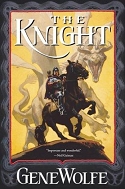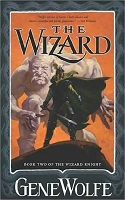

The premise of this novel is that a young boy, who is the novel's entire narrator, is kidnapped by the Aelf because he unknowingly cut the wood of the very rare and magnificent spiny orange tree; for this transgression he is brought to Mythgarthr. Some of his memories are lost, and he recounts through the entirety of the novel how he goes from initially being a lost and lonely boy who awakens in a cave with the woman Parka to becoming a person of great distinction. She riddles with him with scraps of cryptic information and gifts with him magical bowstring. The boy, who never reveals his name, slowly and tenuously tries to make this magical land of ogres, griffins, knights, and all manner of weird and wonderful creatures typical of any fantasy escapism, his home. What's more, the boy recounts to his brother, a brother he can not forget, one he chooses not to forget, how he meets up with a doughty knight and is inspired to become a knight. In this land of Mythgarthr the physical laws are different. Mythgarthr is the middle landscape of seven worlds than can be traversed in a limited manner by those who live in them. It is a touch of sheer incredulous chutzpah for an author to attempt this, but Gene Wolfe does it with aplomb. Calling himself Able, soon to be called Able of the High Heart; after an encounter with Disiri, a powerful Mossmaiden of the Aelf, to whom he gets to know as a boy but leaves after a short stay as a fully grown muscular man, be it still that he has the mind of a boy, he swears his undying love to her and vows never to wield any sword other than that of the legendary Eterne. It seems that no matter where Able goes in this novel, trouble troubles our new knight. Almost each and every chapter is a mini adventure in itself. Dotted around the entire novel are forays, melees, magical creatures, grandiose buildings, ethereal beings, all of which inundate the reader with a bountiful plethora. You will not be bored with this novel. Wolfe' narrative at times does not run smooth, he has this preponderance for starting a segment within a chapter, or indeed starting a chapter anew, with retelling of events which were lead up to very quickly and with sudden alacrity, though which are left unexamined. The scene where Able rides atop Gylf and slays the mountain men who stole the gifts destined for the King is just one example. One second he is going into battle with bloodlut and beserker blood pumping through his veins, the next paragraph reads from the aftermath of the massacre - slightly disappointing. The author seems to want to keep the gore level of his storyline down to minimum.
Some of the seven plane of existence are examined and detailed with a lot of subtle touches, Aelfrice in particular is visited and revisited on a number of occasions. My one major caveat is that we do not meet any of the great kings or villains in this novel; that is not until the very end, and some of the companions that Able picks up along the way benefit him with their mercurial aegis a little too readily. It all seems a little too easy for Able at times. I can't help but feel that Able is being set up for a fall in the follow up novel The Wizard. A part of me hopes he is.


Such a strange follow up is The Wizard. Able, killed at the end of the previous installment, returns to Mythgarthr. His name is near legendary, his deeds are legend, yet, all is still not well with our hero. His sense of duty and honour troubles him even in death. Having earned the aegis of the Valfather, Able descend from Skai atop the magical mare Cloud possessed with powers he informs his brother that he has promised never to use. So begins his series of adventures. After having just finished this novel I wonder why it was so titled - we experience no real sorcery incandescing from Able's fingertips. All his magic is tied to those he has help, freed, saved, and befriended as a young man looking to become a knight. Almost the entire novel takes place in two castles - Utgard, home of King Gilling of the Frost Giants of Jotunland, and Thortower, the royal court of King Arnthor. I wryly refer to this novel as the Tale of Two Towers. The first problem this novel possesses is that the plot is disjointed and at times aimless. Wolfe seems unable to give a direct and cogent occurrence of events to gel seamlessly. Too often he has Able descend into Aelfrice as a way of keeping the flow of the novel from stalling. Using Aelfrice as a medium to change how time passes should have been used more sparingly. The second major fault is their is too much waffle. Court intrigue is one thing, but having well intentioned men-at-arms, dutiful squires, and lords and ladies bend you ear as they probe for advice in page after page after of dialogue is just plain tedious. There is no denying that this follow up novel is for the majority a very easy going and adolescent adventure dressed up in its father's robes and chain mail. Not as well written or as engaging as the previous offering, but it has a charm all its own.

| Authors | Awards | Blogs |
| Fanzines | Index | Magazines |
| Publishers | Retailers | Reviews |